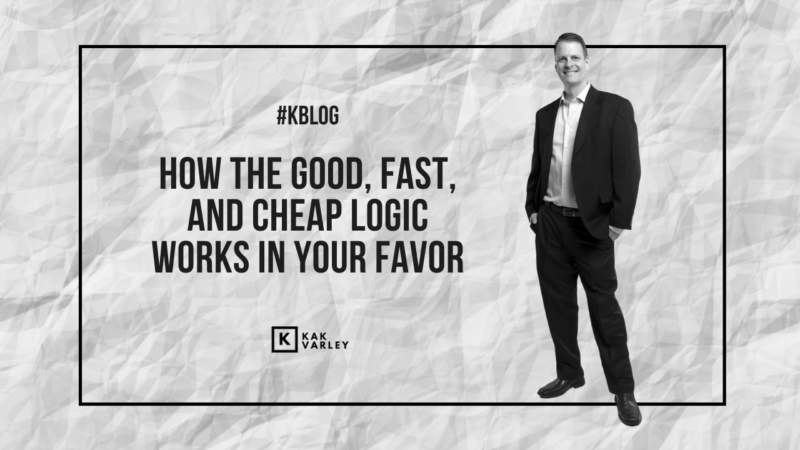How the Good, Fast, and Cheap Logic Works in Your Favor
How the Good, Fast, and Cheap Logic Works in Your Favor https://csuiteold.c-suitenetwork.com/advisors/wp-content/themes/csadvisore/images/empty/thumbnail.jpg 150 150 Kak Varley https://secure.gravatar.com/avatar/5d79c97535790184fc94a15ea9eecda5?s=96&d=mm&r=g
In the service business, there’s a phrase often referenced that goes like this: “Good, Fast, and Cheap…Which two to do you want?” The concept is that every service offering has those 3 components, and you will only get 2 out of the 3 of those components.
Imagine this is a game show and you have three buttons to push – Quality, Speed, and Cost. Let’s say you hit the Quality button. That means you can only choose Speed or Cost, not both.
At this point is where people will say to me, “Well, why can’t I get all three?” My reply to that is, “Give me an example where you’ve gotten all three”, and invariably, I will show them that they didn’t truly get all three. To me, if you get all three components, you’ve found a unicorn. And of course, unicorns don’t exist in my world.
Setting Expectations for a Healthier Experience
Regardless if you want to argue the point of only getting 2 out of 3, the real benefits of this logic come around when you enter into a deal or purchase. By choosing the two that are most important to you, you will be able to negotiate a deal and qualify a service provider much better.
You are also reducing your overall stress because you’re not asking a provider to do something that is outside their core competencies.
When I go into negotiations with any service person, I will go so far as to tell them which one of one of those three are not as important to me. I will say, “I really need a quality job done and have it turned around fast, so I understand that might cost more.” Every time I do that, the experience is so much smoother because it:
- Shows respect for the services being provided.
- Comforts the provider in knowing that they can achieve the goals.
- Eliminates my anxiety because I know I don’t have to micromanage their work.
Wedding Example
Let’s talk about a wedding… Let’s say you just got engaged, so you decide to start looking for a wedding planner. Research, interviews, and proposal gathering ensues…
In the interview process, your Mother (or future Mother-In-Law) states that she is so excited that she wants you to get married sooner than later, which shortens the timeline considerably. You talk it over with your future spouse and agree to her request. By shortening the timeline, you’ve pushed the imaginary Speed button.
First button pushed…
Now that you have your selection of planners that are available for your proposed (pun intended) wedding date, you start looking at proposals. You talk it over and you pick the cheapest proposal. You’ve now hit the imaginary Cost button.
Second button pushed…and you can probably guess what happens next…
You hire the planner but you find out that you’re not really getting the planner you spoke to. Rather, to meet your Cost needs, the planner has assigned a new understudy to your wedding.
Third button cannot be selected unless you deselect one of the other buttons…
The Good, Fast, and Cheap Secret
I take this ‘good, fast, and cheap’ logic one step further to bring it home for people…
There’s a big secret when it comes to your Quality, Speed, and Cost buttons – they are not equal in power. As it turns out, your Cost button has more power than the other two. Rather than thinking of your Cost button being equal in shape and equidistant to each other, imagine the Cost button being the fulcrum to the other buttons that are on opposite ends of a seesaw.
The Cost button is the dominant driver in what goes on with the other two buttons. When you push the Cost button, one of the other two will not be able to be pushed. It’s as simple as that.
The reason why cost is a dominant factor is because it just is. It always is. In my 50 years of living, and 35+ years in sales, I have yet to have anyone come to me saying they got all the money in the world to spend with me. That just doesn’t happen because that’s how our brains are wired. It’s a behavioral trait in us humans that spans across all cultures of the globe.
It’s no wonder that there’s hundreds of sales negotiation books that teach you how to aim high, knowing full well the customer will aim low.
So, in the end, we will ALWAYS push the Cost button when we play the services game…
Manifesting Better Outcomes
Remember that, by accepting this ‘Good, Fast and Cheap’ logic, your overall day-to-day business interactions will become far more trouble-free. That, in turn, means less anxiety. Less anxiety leads to better energy. Better energy manifests better outcomes.
Find out more about marketing strategies at KakVarley.com…
Need a digital marketing consultant, contact us here.

